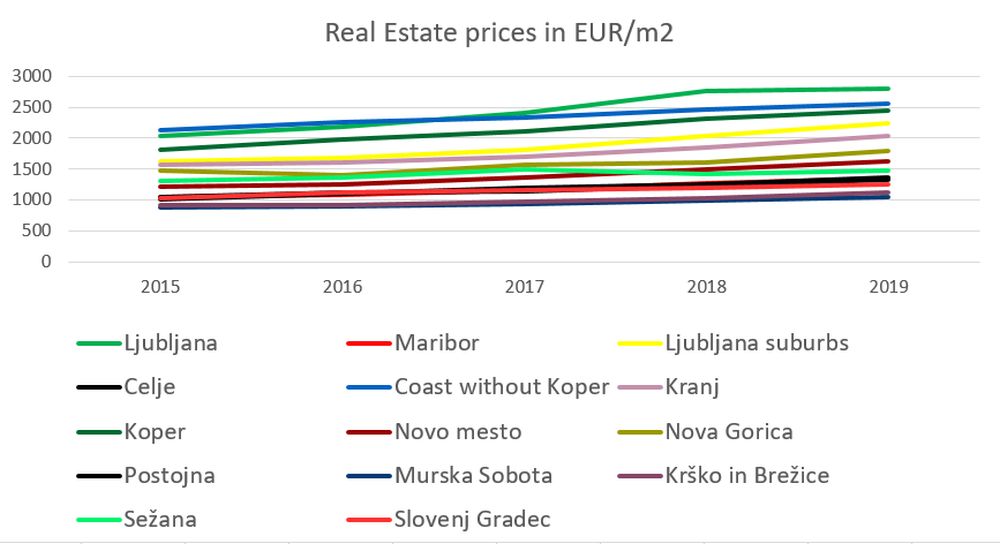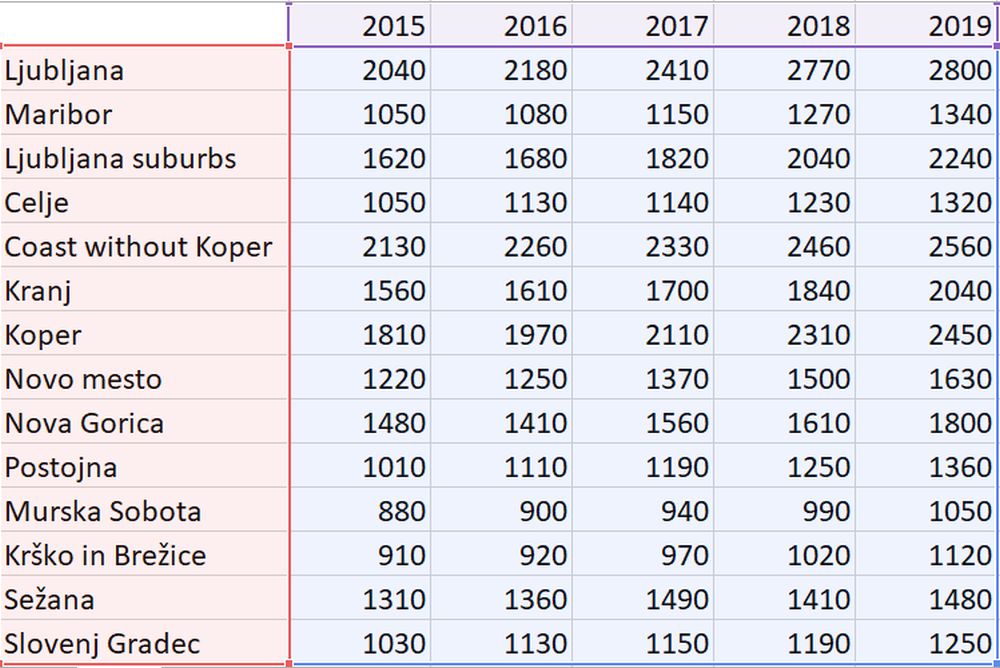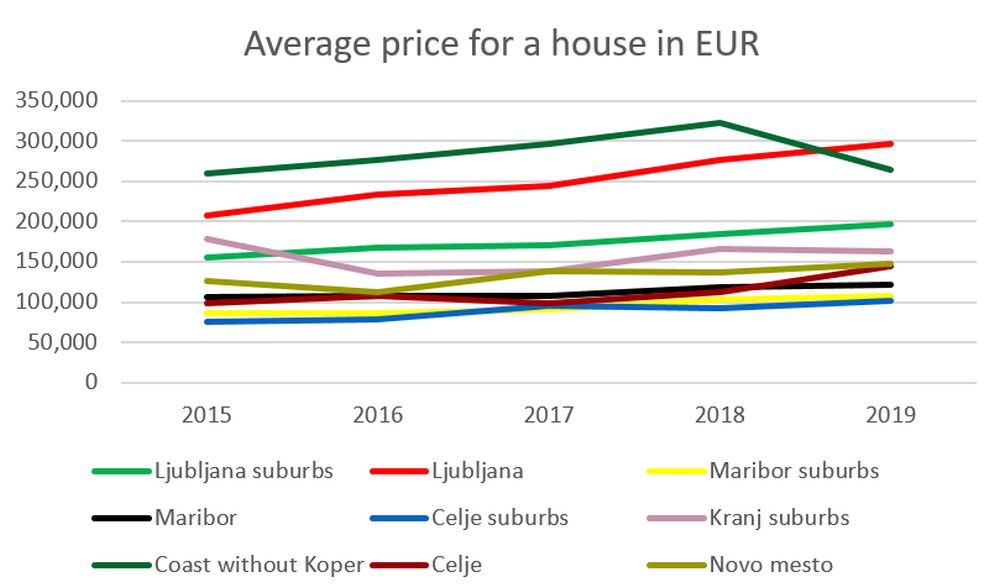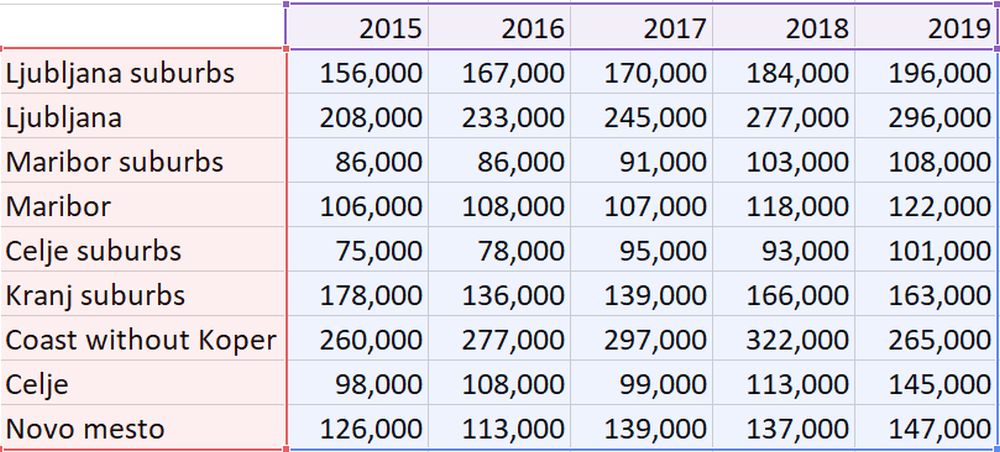Ljubljana related
STA, 27 May 2021 - The National Assembly has adopted an amended housing act whose overarching goal is to increase the number of public rental homes in the country.
Under the new legislation, public housing funds will be allowed to take on more debt to speed up construction of new flats.
According to government projections, an extra EUR 200 million in fresh borrowing for housing construction will be released.
At the same time a public service will be established acting as an intermediary and manager of rental homes.
This is seen as a way to convince owners of empty flats who are hesitant about renting for fear of soured relations with tenants to enter the rental market.
In this scheme, tenants would pay non-profit rent, while some of the gap to commercial rent would be covered by the state.
It is believed that thousands of flats are currently idle, though there are no reliable numbers.
The national Housing Fund will have pre-emptive right to buy municipal land designated for construction to build apartment buildings.
The government believes that up to 10,000 new public rental apartments could be available within five to ten years as a result of the new legislation.
The law also brings the first rise in non-profit rents since 2007 but also higher subsidies for eligible tenants.
Among the changes the bill brings is also a lower quorum of home-owners in blocks of flats needed to approve works for which a construction permit is needed.
The legislation has been welcomed by the real estate industry and won some bipartisan support in parliament, where it was confirmed in a 52:1 vote yesterday evening.
STA, 9 March 2021 - The newly established auction web portal of all Slovenian courts (sodnedrazbe.si) saw its first flat sold on Tuesday. The auction took 40 minutes and the flat was sold at nearly double the asking price. Next month, some 300 flats are to go on the portal's auction block.
The E-Auction website will gradually come to replace websites of individual courts. It will feature the sales of all real estate, movables and rights called after 1 February.
To take part, bidders must register with their online certificate and pay the security deposit. The portal enables auctions of real estate and rights in enforcement procedures, while other types of auction are explained on the portal, the Supreme Court said on Tuesday.
It added that the portal is easy to use and that the bidding is completely anonymous. Credibility of bidding is ensured, as bidders are not allowed to either withdraw or deny their bids, they also cannot bid outside the designated time frame.
The portal, set up in February, works on all computer operating systems and mobile devices and is accessible also to the visually and hearing impaired.
You can visit the portal here
STA, 12 November 2020 - The newspaper Delo examines the reasons for what it describes as "immunity of the safe property market" in the headline of Thursday's front-page commentary as prices of residential properties keep increasing in Slovenia and Europe against the expectations and despite the crisis.
Despite the 7.9% contraction in the country's GDP in the first half of the year and the economic crisis, demand for residential properties remains strong, while demand for hotel, hospitality and office properties is decreasing, the paper notes.
"Most on the demand side are those who spent the spring lockdown in small homes (...), while there are also individuals and businesses with a lot of capital who are looking for safe investment opportunities. An additional stimulus is negative interest rates that may drop further in the future."
The paper goes on to say that despite the demand being increased by some empty properties due to the crisis in the tourism sector, the shortage of real estate in Slovenia for the past 20 years has been such those empty properties do not make much difference.
"What is more, owners of empty properties are now even willing to wait for the country and international space to reopen before they return to rental business.
"Ownership is a major priority for Slovenians as it is, while now it appears to be supplemented with investments in real estate. These will certainly be driven by a chronic shortage thereof.
"It may be an indirect consequence of negative interest rates, or the trends may also be linked to the Europeans being culturally not in favour of venture investment and relying on conservative ways of personal and business finance management."
STA, 4 October 2020 - Nepremicnine.net, the leading real estate website in Slovenia, has been taken over by Real Web, a company owning several leading internet real estate platforms in Europe. According to news portal Siol, Real Web has acquired a 60% stake, while the rest will be preserved by Nepremicnine.net's founders.
Nepremicnine.net, established in 1999, has developed into the leading internet real estate platform in Slovenia and is also one of the busiest websites in the country with about 800,000 visits each month.
The takeover, whose details have not been disclosed, strengthens the presence of the international group Indomio, associated with Real Web, in Europe. The group includes the biggest internet real estate platform in Italy Immobiliare.it as well as the leading Greek platform Spitogatos.gr.
Nepremicnine.net co-founder and executive director Primož Jazbec told Siol that cooperation with Indomio presents a strategic opportunity, providing the platform with crucial technological know-how to grow business operations.
"It also secures long-term growth as a result of the strongest possible positioning in other EU member states," he added.
Immobiliare.it co-founder Silvio Pagliani said that they had known Jazbez and Aleš Ravnikar, also a co-founder, for several years and were exited to start cooperating.
"This cooperation allows us to continue building the leading real estate platform in multiple European countries," Pagliani said.
Spitogatos.gr co-founder and executive director Dimitris Melachroinos said the joint brand will be even more recognisable due to shared technology.
STA, 23 September 2020 - The prices of residential properties in Slovenia in the second quarter of 2020 were up 1.9% compared to the first quarter, and 5.2% higher than in the same period last year, the Statistics Office said. But transactions were significantly lower, with the total value of all real estate sold being the lowest since the first quarter of 2015.
The prices of new apartments and houses were up by 7.1% compared to the previous quarter.
After dropping by 0.3% in the first quarter, the prices of new apartments jumped by 7.5% in the second. New houses were also 2.6% costlier than in the first quarter.
The prices of used homes rose by 1.4% in quarterly comparison. This means 1.6% higher prices for used apartments, and 1% for houses.
Family properties were on average 5.2% costlier in the second quarter of this year than in the second quarter of 2019. Up the most were the prices of new family houses (by 23.6%) and used apartments outside Ljubljana (by 7.8%). Meanwhile, a notable drop was recorded in the prices of used apartments in Maribor (by 1.2%).
The total value of all residential real estate sold in the second quarter reached EUR 229 million, which is some EUR 60 million less than in the first quarter.
This is also the lowest total value of all residential real estate sold since the first quarter of 2015, when sales stood at EUR 207.
The Statistics Office partly attributes the drop in transactions to the Covid-19 epidemic, which virtually stopped all activity on the Slovenian real estate market.
A total of 2,161 units of used residential real estate were sold in the second quarter, in the total value of EUR 220 million, which is almost half of the figure recorded in the same period last year.
Only 55 pieces of new residential real estate worth EUR 10 million in total were sold in the second quarter, while in the first 76 were sold worth EUR 14 million.
More data on house prices in Slovenia
STA, 20 August 2020 - As soon as the strict coronavirus measures were relaxed at the end of April the property market picked up, yet there are still fewer transactions than before the epidemic. Demand still exceeds supply, keeping average prices high, partly because of the many deals in Ljubljana, where prices are well above the national average.
"At the moment there are fewer transactions on the property market," the director and owner of real estate agency Stan Nepremičnine, Stanka Solar, told the STA.
She said this trend could be seen over the past month, so she partly attributes it to the summer season and a lack of adequate supply of used flats at good locations.
Solar said demand was strong in particular for higher-end new housing, but she believes new flats or houses are "slightly mispriced given the buyers' expectations".
"The majority of people expect a price correction for property which needs energy renovation and for more expensive new housing."
Similarly, Boris Veleski from Mreža Nepremičnin said the number of transactions was much lower after the epidemic, even though a month after it the market started to rebound.
Remax Ljubljana said that "at this moment we don't see any major changes in transactions, as demand still exceeds supply".
Urška Hočevar from this estate agent said the market is dominated by strong, motivated buyers who have a clear vision and know how they will finance the purchase.
Preliminary data by Slovenia's Surveying and Mapping Authority (GURS) for the first six months shows some 5,400 deals with flats and houses were carried out, down 35% from the same period in 2019.
However, these transactions amounted to EUR 532 million, which is 70% of all property transactions, an absolute record for a six-month period, GURS has recently said.
According to Solar, there is much demand for one- and two-room flats, but also for three-room flats, especially second-hand properties which do not require major investments.
Flats with a lift and a parking area are also in high demand.
She said there is an increasing number of buyers who have some savings and deem a piece of property the safest investment.
Mreža Nepremičnin said there is a lot of demand for smaller flats, up to 65 square metres, but also for larger ones, over 100 square metres.
Remax said cheaper flats near the city centre are in high demand.
"However, already during the epidemic we detected some more demand for houses, holiday homes and land, as many found it hard to be in a flat during lockdown," said Hočevar.
GURS data also shows the prices of used flats rose by 7% in the January-June period compared to the same period in 2019, with an average price per square metre exceeding EUR 1,900 for the first time.
Solar corroborated this, saying "the prices of used properties have increased. Demand still exceeds supply and there is currently a lack of housing at desired locations into which a new owner could move in a few months".
She said the prices of rental homes had meanwhile dropped by some 15-20% compared to before the coronacrisis.
Mreža Nepremičnin and Remax have not noticed any price drops either. Hočevar said a downward correction was possible in the long-term.
Fewer tourists from abroad have meanwhile given a headache to many owners who took out loans to buy flats for short-term rental. These loans need to be repaid regardless of the current lack of demand by tourists.
"Some of these flats have been put up for sale, but not that many, other owners have opted for medium-term rental if they could, because many hope or believe that things will soon be the same as before the epidemic," said Veleski.
Solar said many of those who had been renting through Airbnb and Booking decided to rent to students or other individuals for the long or medium term.
Hočevar said that even those owners who insisted on short-term renting this summer in Ljubljana or other tourist areas will eventually be forced to rent for the long-term or even sell.
The estate agents largely agree that the pandemic has made it hard to predict the trends in the coming months.
Solar does not expect any major price changes until the end of the year, except for housing in need of energy renovation and for relatively pricey new housing.
Veleski believes much will depend on developments outside Slovenia's borders. He thinks the existing trend will last at least until spring 2021.
All our stories on property in Slovenia
STA, 7 August 2020 - Preliminary data by the Surveying and Mapping Authority indicate about a 40% drop in both the number of deals and turnover in real estate in the first half of 2020. Prices of used flats meanwhile continued to grow, by 3% compared to the second half of 2019, taking the average square metre price in the country above EUR 1,900 for the first time.
The latest stats on Slovenia and coronavirus are here
The data, released on Friday, show 10,800 transactions were registered in the first six months in a total value of EUR 770 million. This is a 40% drop for both figures compared on the second half of 2019 and a 40% and 45% decline respectively year-on-year.
The Surveying and Mapping Authority said that in the face of an almost complete market freeze during the lockdown, it decided to publish the preliminary data even though a fair part of deals for the first six months had not yet been registered and processed for proper market analysis. Final data will be released in October.
The body estimates that the actual year-on-year decline in the number of deals and in turnover will be between 35% and 40%. It pointed out that 2019 had seen record figures, mostly due to an unusually high number of deals involving commercial real estate.
As for the continuing rise in the prices of used flats - by 3% on the second half of 2019 and by 7% year-on-year - the Surveying and Mapping Authority noted a similar phenomenon had been seen in 2008.
"In such circumstances it is only the better and fairly expensive flats that continue to get sold and their prices are not decreasing yet due to market inertia," the experts wrote, while pointing out that the market picked up again in May as the epidemic was declared over.
Housing property accounted for almost 70% of total turnover in the first half of the year, up significantly on previous years and even above the 66% recorded in 2015. Between January and 15 July, 5,450 transactions were recorded, a 37% decrease on the second half of 2019 and 36% year-on-year. Turnover for new flats was down by more than 70%.
The number of recorded transactions with land suitable for construction on the other hand fell by only a third compared to the first and second half of 2019, while the number of deals involving farm and forest land decreased by about half.
All our news on real estate in Slovenia
STA, 7 July 2020 - Since Croatia entered the EU in 2013, Slovenian citizens purchased a total of 9,439 properties in the country, which makes them the most numerous foreign owners of real estate in Croatia in that period.
Unofficial estimates meanwhile put the total number at 110,000, mostly houses or apartments on the Croatian coast, as the bulk of them were bought during the times of the former Yugoslavia.
Citing data from the Croatian Tax Administration, Večernji List says that there should be no concern in Croatia that the Slovenian government would prohibit its citizens from entering Croatia.
Slovenia will not be restricting its citizens in going to the neighbouring country during the Covid-19 pandemic because it will protect the interest of property owners, the Croatian newspaper adds in a report on Tuesday.
When it comes to purchases of real estate in Croatia in the last seven years, Slovenians are followed by Germans (4,969), Austrians (2,867), Italians (1,612), Swedes (1,232) and Hungarians (949).
According to the Croatian Tax Administration, only around 4,400 foreign owners are officially leasing their real estate to tourists and pay tax for that.
Večernji List says that the state body has no complete data on real estate owners in one place, and that precise data will be obtained after a census, which is planned in Croatia next year.
STA, 16 June 2020 - Reflecting on the housing market in Ljubljana, the business daily Finance points in Tuesday's commentary to the simultaneous increase in newly available flats and the pending drop in purchasing power.
The building of apartments was sped up quite noticeably last year, with more than 988 multi-unit buildings being completed, almost double the 2018 number.
By far the largest number of new flats appeared in Ljubljana. And while people were complaining a few years ago that the focus was only on high-end housing, quite a few "normal" flats are being built in the capital now.
A problem may however appear on the demand side, the paper says, pointing to bleak economic forecasts for this year and the fact that few people can afford to buy an apartment as it is.
The price growth of flats in Ljubljana stopped already last year. Given the simultaneous rise in supply and decrease in purchasing power - even if the Surveying and Mapping Authority says that demand still exceeds supply, prices could also fall.
"Considering all this, we might soon no longer be wondering who will buy a flat costing EUR 5 million but will buy one for EUR 150,000," Finance says in the commentary, entitled Who Will Buy a Flat for EUR 5m?
The 2019 Real Estate Market Report, published by the Surveying and Mapping Authority of the Republic of Slovenia, shows that property prices continued to grow last year.
In 2019 the prices of apartments across the country broke the previous record set in 2008. In Ljubljana, however, the record was already broken in 2018.
The national average for a square metre of an apartment was €1,850 in 2019, 2% higher than the national average in 2008.
Since 2015, housing prices have risen steadily. The highest price growth was recorded in 2018, when the prices of second-hand flats were, on average, 9% higher than in the previous year, despite the decrease in the number of sales. In 2019 housing price growth continued at a slightly lower rate.

Apartment price averages in euros per square meter:

The average price of a residential house with land belonging to it in Slovenia was EUR 128,000 in 2019, 3% higher than in the previous year and 19% higher than in 2015. Since 2015 the average area of homes sold has increased significantly, while their average age and the area of land they come with have not changed significantly. Taking into account the characteristics of the houses sold, it has been estimated that house prices at the national level have grown by 15 to 20% in real terms since 2015, while compared to 2018 they have remained virtually unchanged.

Average price for a house in EUR:






